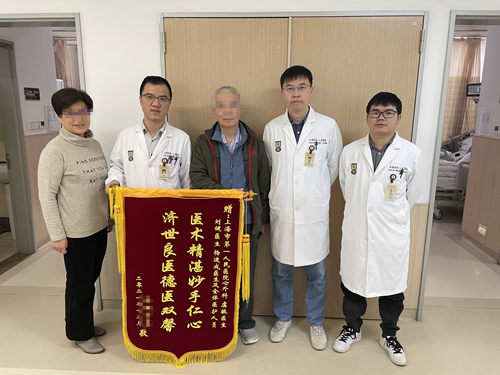- News
Multidisciplinary Cardiac and Macrovascular Surgery Department at Shanghai General Hospital Treated A Patient with Type B Aortic Dissection Complicated by Severe Intestinal Ischemia

Recently, the cardiac and macrovascular surgery department at Shanghai General Hospital successfully treated a patient with type B aortic dissection complicated by severe intestinal ischemia with multiple disciples. They overcame the difficulties of acute aortic coarctation, postoperative infection, intestinal ischemia-reperfusion injury, liver and kidney function damage through difficult emergency surgery, anti-infection, parenteral nutrition support, psychological care and other life-saving measures.
The patient, Mr.Yu (pseudonym), suddenly felt pain in his chest and back one day in October last year, and the pain progressed after resting for some time. When he came to Shanghai General Hospital for emergency treatment, his superior mesenteric artery was entrapped, and the true lumen was narrow. Mr.Yu was admitted to the ward by the Department of Cardiac and Macrovascular Surgery, and was immediately treated with blood pressure control and symptomatic support.
During the observation, Mr. Yu felt that his abdominal pain worsened and started to show symptoms such as abdominal distension, erratic flow, exhaustion, and cessation of bowel movement, etc. Dr. Jian Liu, assocaite chief physician of cardiac and macrovascular surgery department, and Yang Dicheng, deputy director of the department(North), assessed that there was a possibility of ischemic necrosis in his intestine. The mortality rate of aortic dissection complicated by intestinal ischemia was extremely high, and interventional surgery was the only treatment to save his life. After fully communicating with the family members, Dr.Liu Jian and Dr.Shi Sheng, associate chief physician of cardiac and macrovascular surgery department,Dr.Shi Feng, associate chief physician of the anesthesiology department, technologist Zhang Guorong, Nurse Zhang Jun and other members of the surgical team quickly completed the preoperative preparation and carried out the surgery at the first time.
The intraoperative angiography showed that the middle segment of the superior mesenteric artery was occluded, but there was a side branch of the abdominal trunk to provide blood supply. The difficulty of the operation was to precisely insert the microcatheter guidewire into the main mesenteric artery in the occluded vessel. The surgical team used the "arterial superselective intervention technique" to accurately insert the guidewire into the mesenteric artery trunk. After implanting the stent, the balloon expanded sequentially and the dry intestinal vessels were refilled with blood. The surgical team then performed a thoracic aortic stent intervention to close the intimal rupture and reconstruct a patent and intact aorta under X-ray. 2 hours later, the surgery ended successfully, but Mr. Yu's treatment had just begun.
The postoperative intestinal ischemia-reperfusion injury was very aggressive. On the night of surgery, the patient had more than ten bloody stools, totaling 1800 ml. After an overnight of aggressive anti-shock and hemostatic treatment, Mr. Yu's vital signs were gradually stabilized and was taken off the ventilator. Various examinations suggested that although the patient's intestine was not necrotic, it had been severely damaged and almost lost its function, the intestinal barrier had been destroyed, and the subsequent recovery would be long and bumpy.
Due to the patient's anemia and weakness, he had repeated chills and high fever, and often had diarrhea after eating a few mouthfuls of porridge and soup. Dr.Jian Liu and Min Yu, who is in charge of postoperative monitoring, invited experts from the Department of Gastroenterology, Department of General Surgery, Department of Acupuncture and for consultations to jointly develop a treatment plan. The treatment team repeatedly screened for infection, adjusted antibiotic use, and calculated the best parenteral nutrition support strategy based on the patient's condition.
In addition to the physical condition, the patient's psychological stress should not be ignored. Mr. Yu was agitated by his recurring illness, blood and imaging tests, the pain of not being able to eat, and the nearly 20-hour daily infusions, and even became resistant to treatment. Nurse practitioner Ji Jin and charge nurse Chen Lihong often provided psychological care for the patient to ease his anxiety. The team also installed a removable infusion pump for him so that he could move freely during the infusion.
About 3 months later, under the careful medical treatment and care of the cardiac and macrovascular surgery team, the patient's intestines finally recovered from paralysis and could eventually eat just as a normal person does.
It is reported that aortic dissection is one of the fatal chest pain emergencies, and superior mesenteric artery occlusion is one of the most serious comorbidities. For more than ten years, our cardiac and macrovascular surgery team has completed a large number of aortic dissection surgeries and comprehensive treatment, which has saved the lives of many patients.
(Correspondent/Jian Liu, Department of Cardiac and Macrovascular Surgery)
